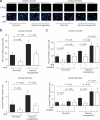Adiponectin protects against myocardial ischemia-reperfusion injury through AMPK- and COX-2-dependent mechanisms
- PMID: 16155579
- PMCID: PMC2828682
- DOI: 10.1038/nm1295
Adiponectin protects against myocardial ischemia-reperfusion injury through AMPK- and COX-2-dependent mechanisms
Abstract
Obesity-related disorders are associated with the development of ischemic heart disease. Adiponectin is a circulating adipose-derived cytokine that is downregulated in obese individuals and after myocardial infarction. Here, we examine the role of adiponectin in myocardial remodeling in response to acute injury. Ischemia-reperfusion in adiponectin-deficient (APN-KO) mice resulted in increased myocardial infarct size, myocardial apoptosis and tumor necrosis factor (TNF)-alpha expression compared with wild-type mice. Administration of adiponectin diminished infarct size, apoptosis and TNF-alpha production in both APN-KO and wild-type mice. In cultured cardiac cells, adiponectin inhibited apoptosis and TNF-alpha production. Dominant negative AMP-activated protein kinase (AMPK) reversed the inhibitory effects of adiponectin on apoptosis but had no effect on the suppressive effect of adiponectin on TNF-alpha production. Adiponectin induced cyclooxygenase (COX)-2-dependent synthesis of prostaglandin E(2) in cardiac cells, and COX-2 inhibition reversed the inhibitory effects of adiponectin on TNF-alpha production and infarct size. These data suggest that adiponectin protects the heart from ischemia-reperfusion injury through both AMPK- and COX-2-dependent mechanisms.
Figures





Comment in
-
Fat, keeping the heart healthy?Nat Med. 2005 Oct;11(10):1048-9. doi: 10.1038/nm1005-1048. Nat Med. 2005. PMID: 16211035 No abstract available.
Similar articles
-
Fat, keeping the heart healthy?Nat Med. 2005 Oct;11(10):1048-9. doi: 10.1038/nm1005-1048. Nat Med. 2005. PMID: 16211035 No abstract available.
-
TNF-α antagonism ameliorates myocardial ischemia-reperfusion injury in mice by upregulating adiponectin.Am J Physiol Heart Circ Physiol. 2015 Jun 15;308(12):H1583-91. doi: 10.1152/ajpheart.00346.2014. Epub 2015 Apr 17. Am J Physiol Heart Circ Physiol. 2015. PMID: 25888509
-
Adiponectin protects against myocardial ischaemia-reperfusion injury via AMP-activated protein kinase, Akt, and nitric oxide.Cardiovasc Res. 2008 Apr 1;78(1):116-22. doi: 10.1093/cvr/cvn017. Epub 2008 Jan 25. Cardiovasc Res. 2008. PMID: 18222959
-
AMP-activated protein kinase: the guardian of cardiac energy status.J Clin Invest. 2004 Aug;114(4):465-8. doi: 10.1172/JCI22683. J Clin Invest. 2004. PMID: 15314681 Free PMC article. Review.
-
Adiponectin protects against myocardial ischemia-reperfusion injury: a systematic review and meta-analysis of preclinical animal studies.Lipids Health Dis. 2024 Feb 17;23(1):51. doi: 10.1186/s12944-024-02028-w. Lipids Health Dis. 2024. PMID: 38368320 Free PMC article. Review.
Cited by
-
Endothelial extracellular vesicles contain protective proteins and rescue ischemia-reperfusion injury in a human heart-on-chip.Sci Transl Med. 2020 Oct 14;12(565):eaax8005. doi: 10.1126/scitranslmed.aax8005. Sci Transl Med. 2020. PMID: 33055246 Free PMC article.
-
Myocardial mitochondrial and contractile function are preserved in mice lacking adiponectin.PLoS One. 2015 Mar 18;10(3):e0119416. doi: 10.1371/journal.pone.0119416. eCollection 2015. PLoS One. 2015. PMID: 25785965 Free PMC article.
-
Effects of candesartan in hypertensive patients with type 2 diabetes mellitus on inflammatory parameters and their relationship to pulse pressure.Cardiovasc Diabetol. 2012 Oct 3;11:118. doi: 10.1186/1475-2840-11-118. Cardiovasc Diabetol. 2012. PMID: 23034088 Free PMC article. Clinical Trial.
-
Therapeutic impact of follistatin-like 1 on myocardial ischemic injury in preclinical models.Circulation. 2012 Oct 2;126(14):1728-38. doi: 10.1161/CIRCULATIONAHA.112.115089. Epub 2012 Aug 28. Circulation. 2012. PMID: 22929303 Free PMC article.
-
The roles of epicardial adipose tissue in heart failure.Heart Fail Rev. 2022 Jan;27(1):369-377. doi: 10.1007/s10741-020-09997-x. Heart Fail Rev. 2022. PMID: 32601785 Review.
References
-
- Eisenberg MS, Mengert TJ. Cardiac resuscitation. N. Engl. J. Med. 2001;344:1304–1313. - PubMed
-
- Rogers WJ, et al. Temporal trends in the treatment of over 1.5 million patients with myocardial infarction in the US from 1990 through 1999: the National Registry of Myocardial Infarction 1, 2 and 3. J. Am. Coll. Cardiol. 2000;36:2056–2063. - PubMed
-
- Wolk R, Berger P, Lennon RJ, Brilakis ES, Somers VK. Body mass index: a risk factor for unstable angina and myocardial infarction in patients with angiographically confirmed coronary artery disease. Circulation. 2003;108:2206–2211. - PubMed
-
- Orlander PR, et al. The relation of diabetes to the severity of acute myocardial infarction and post-myocardial infarction survival in Mexican-Americans and non-Hispanic whites. The Corpus Christi Heart Project. Diabetes. 1994;43:897–902. - PubMed
-
- Scherer PE, Williams S, Fogliano M, Baldini G, Lodish HF. A novel serum protein similar to C1q, produced exclusively in adipocytes. J. Biol. Chem. 1995;270:26746–26749. - PubMed
Publication types
MeSH terms
Substances
Grants and funding
- HL77774/HL/NHLBI NIH HHS/United States
- HL07224/HL/NHLBI NIH HHS/United States
- P01 HL066957-040004/HL/NHLBI NIH HHS/United States
- HL66957/HL/NHLBI NIH HHS/United States
- T32 HL007224/HL/NHLBI NIH HHS/United States
- P01 HL066957/HL/NHLBI NIH HHS/United States
- AR40197/AR/NIAMS NIH HHS/United States
- R01 AG015052-04/AG/NIA NIH HHS/United States
- R01 AG015052/AG/NIA NIH HHS/United States
- AG15052/AG/NIA NIH HHS/United States
- R37 AG015052/AG/NIA NIH HHS/United States
- R01 AR040197-15/AR/NIAMS NIH HHS/United States
- R01 AR040197/AR/NIAMS NIH HHS/United States
- R01 HL077774/HL/NHLBI NIH HHS/United States
- R01 HL077774-01A1/HL/NHLBI NIH HHS/United States
LinkOut - more resources
Full Text Sources
Other Literature Sources
Molecular Biology Databases
Research Materials
Miscellaneous

